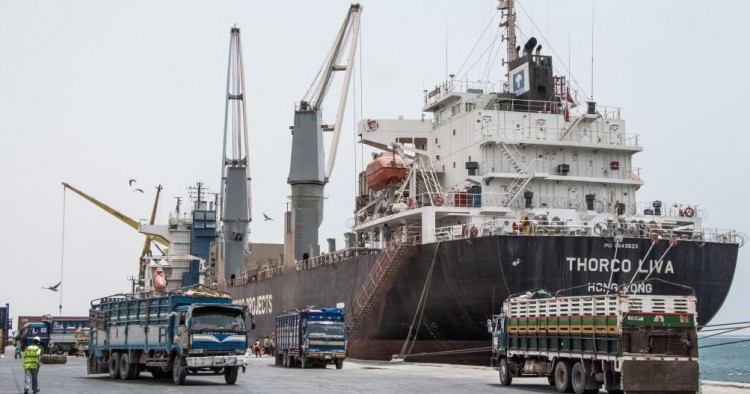Berbera and Zeila, two of the Horn of Africa’s ancient trading cities, have long attracted the interest of global powers because of their strategic location near the Bab el-Mandeb Strait connecting the Gulf of Aden and the Red Sea. This location makes Somaliland’s coastal ports among the region’s most valuable real estate and an alternative to Djibouti as a key player in terms of trade, development, energy, and water security for the Red Sea and Horn of Africa.
Richard Burton, the British explorer, recognized the importance of Berbera port back in 1896, writing:
In the first place, Berbera is the true key of the Red Sea, the centre of East African traffic, and the only safe place for shipping upon the western Eritrean shore, from Suez to Guardafui. Backed by lands capable of cultivation, and by hills covered with pine and other valuable trees, enjoying a comparatively temperate climate, with a regular although thin monsoon, this harbour has been coveted by many a foreign conqueror. Circumstances have thrown it as it were into our arms, and, if we refuse the chance, another and a rival nation will not be so blind.
A new geopolitical rivalry in the Red Sea
Somaliland’s ports still remain the object of international interest and rivalry today, although the foreign powers involved have changed. On July 1, according to an official statement, Taiwanese Foreign Minister Joseph Wu said Taiwan had agreed to establish ties with Somaliland based on “friendship and a shared commitment to common values of freedom, democracy, justice, and the rule of law."
Less than a week later, however, Somalia’s federal government, led by President Mohamed Abdullahi Mohamed, aligned itself with China to prevent a Taiwanese-Somaliland nexus that would have clear geopolitical ramifications for the Horn of Africa.
While China and Somalia rebuffed and condemned the new strategic bilateral ties between Somaliland and Taiwan, the U.S. National Security Council has blessed Taiwan’s venture into East Africa, sending a clear message to China that the U.S. stands with Taiwan. This is a significant blow to the Chinese government, which has used its international influence and “development-trap diplomacy” in recent decades to rally support among African and Middle Eastern states for its efforts to suppress Taiwan’s presence in the international sphere.
Egypt, Ethiopia, and Somaliland
On July 12, a high-level delegation from Egypt traveled to Somaliland. Although an Egyptian delegation had visited in 2019, angering Somalia, this year’s trip comes at a critical time as Ethiopia and Egypt have locked horns in their dispute over the Grand Ethiopian Renaissance Dam (GERD). The Egyptian delegation’s visit prompted protests from the Ethiopian government, and Egypt's growing bilateral ties and cooperation with Somaliland are giving Ethiopia GERD problems of its own — as in gastroesophageal reflux disease.
It is important to note that Ethiopia has a 19 percent stake in the port of Berbera, which is managed by the UAE’s DP World with a 51 percent stake, while Somaliland holds 30 percent. In May 2019, Ethiopia signed its first military cooperation agreement with France, which covers joint air cooperation and includes assistance for Ethiopia’s efforts to build up its naval forces — although where the landlocked country plans to dock these naval forces remains unclear. Joking aside, Ethiopia’s naval endeavors are driven by two main factors: first, concerns over the future of Djibouti’s port, which the IMF categorizes as at a “high risk of debt distress,” comparable to the Sri Lankan port of Hambantota, which was built with Chinese financing and which Beijing took control of after Colombo failed to meet its debt obligations; and second, to protect 11 state-owned commercial vessels managed by the Ethiopian Shipping & Logistics Services Enterprise (ESLSE).
Scramble for fragile Somaliland
Although Somaliland is relatively peaceful compared to Somalia, its lack of international recognition makes it fragile and susceptible to being drawn into regional disputes as it seeks allies, bilateral ties, and eventual recognition. This has been the case with the Gulf states, where it has sided with the UAE and Saudi Arabia. In part as a result of this fragility and desire to secure more allies and improve bilateral ties, Somaliland now finds itself in the middle of multiple disputes among other states, including Ethiopia and Egypt and China and Taiwan.
Taken together, the current domestic instability in Ethiopia and its tensions with Egypt over the GERD, combined with the global superpower competition in the Horn of Africa and Red Sea, are a recipe for conflict that could trigger the largest refugee influx in African history. This could destabilize Somaliland and with it key international maritime trade routes, making it vulnerable to insecurity and terrorism that directly affects both Ethiopia and Djibouti, with which it shares its western border.
To reduce future geopolitical uncertainty and security risk in the Horn of Africa and the Red Sea, it’s in the best interest of the international community to take the following steps:
-
Consider recognizing Somaliland;
-
Praise Taiwan-Somaliland relations instead of giving in to Chinese pressure and potentially keeping at bay Russia, which also has a keen interest in establishing a military base at Berbera port; and
-
Include Somaliland in the Red Sea Council and help it develop its own navy.
Guled Ahmed is a Non-Resident Scholar with MEI, a renewable energy and water infrastructure expert, and an entrepreneur. The views expressed in this piece are his own.
Photo by MUSTAFA SAEED/AFP via Getty Images
The Middle East Institute (MEI) is an independent, non-partisan, non-for-profit, educational organization. It does not engage in advocacy and its scholars’ opinions are their own. MEI welcomes financial donations, but retains sole editorial control over its work and its publications reflect only the authors’ views. For a listing of MEI donors, please click here.













